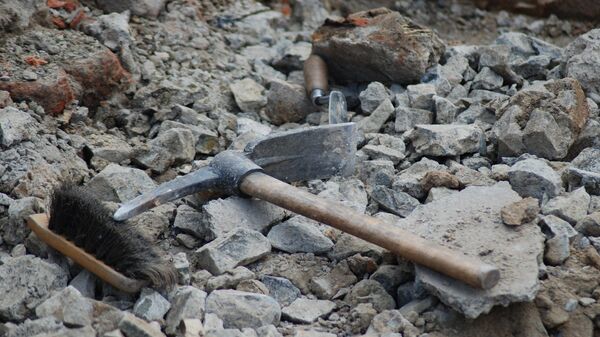The cache of gold coins and the earring were found in a bronze pot, which was lodged between two stones in the side of a well that was part of a house dating back to the Abbasid and Fatimid periods (909-1171 CE).
— Arik Gerber (@ArikGerber) December 3, 2018
The coins and earring were most likely hidden just before the Crusaders (who were part of a series of religious wars sanctioned by the Latin Church in the medieval period) conquered Caesarea in the year 1101, according to the Israel Antiquities Authority.
Archaeologists speculate that the owner of the coins and earring may have died when the most of the city's inhabitants were massacred by Baldwin I's crusader army between 1100 and 1118 CE.
Baldwin I, also known as Baldwin of Boulogne, was the second crusader ruler and first king of Jerusalem from 1100 until his death in 1118.
"The cache is a silent testimony to one of the most dramatic events in the history of Caesarea: the violent conquest of the city by the Crusaders," archaeologists from the Israel Antiquities Authority recently told BBC.
"It is reasonable to assume that the treasure's owner and his family perished in the massacre or were sold into slavery, and therefore were not able to retrieve their gold," the directors of the excavation, Peter Gendelman and Mohammed Hatar, also told the news outlet.
According to Dr. Robert Kool, a coin expert at the Antiquities Authority, the cache is a "unique combination of coins not yet seen in Israel."
— Debborah Donnelly (@DebbyDonnelly) December 3, 2018
Eighteen coins were identified as dinars, the official currency of the Fatimid caliphate that ruled a large area near the Mediterranean Sea from 909 to 1171 AD.
"And a small and extremely rare group of six Byzantine imperial gold coins. Five of the coins are concave and belong to the reign of the Byzantine Emperor Michael VII Doukas (1071-1079 CE)," Kool added.
The multi-year Caesarea project is sponsored by the Edmond de Rothschild Foundation, whose goal is to "promote social empowerment and a collaborative society," and is in cooperation with the Israel Caesarea Development Corp., the Antiquities Authority and the Israel Nature and Parks Authority. The purpose of the project is to preserve the ancient ruins of Caesarea.
The Israeli Antiquities Authority did not immediately respond to Sputnik's request for comment.




